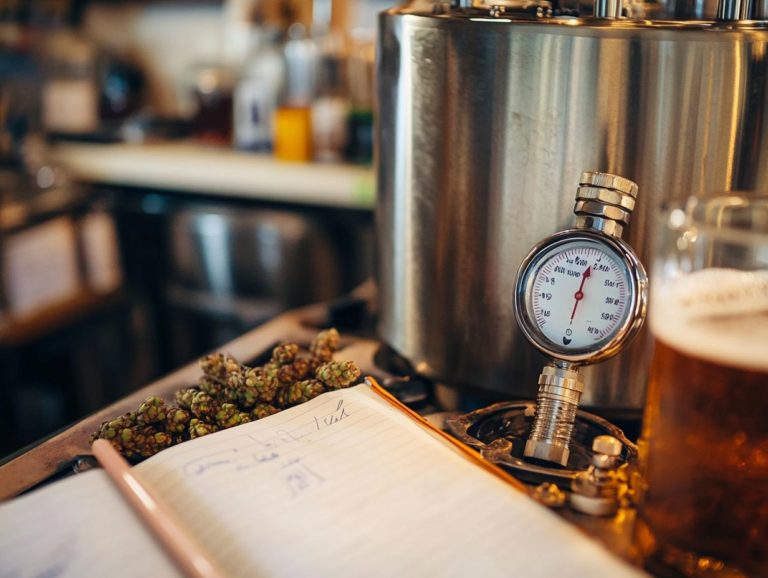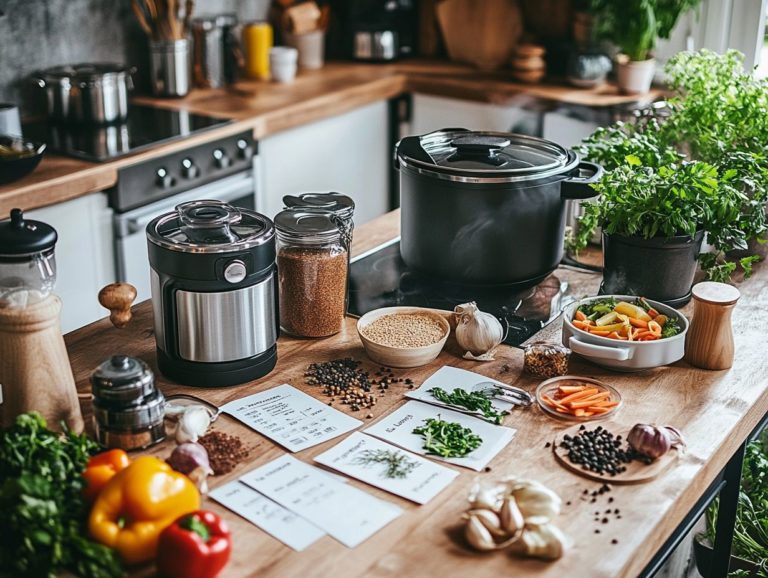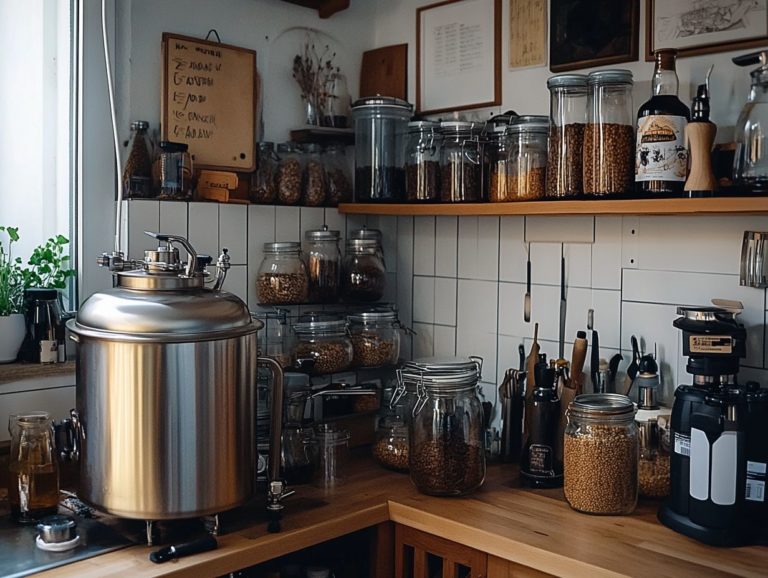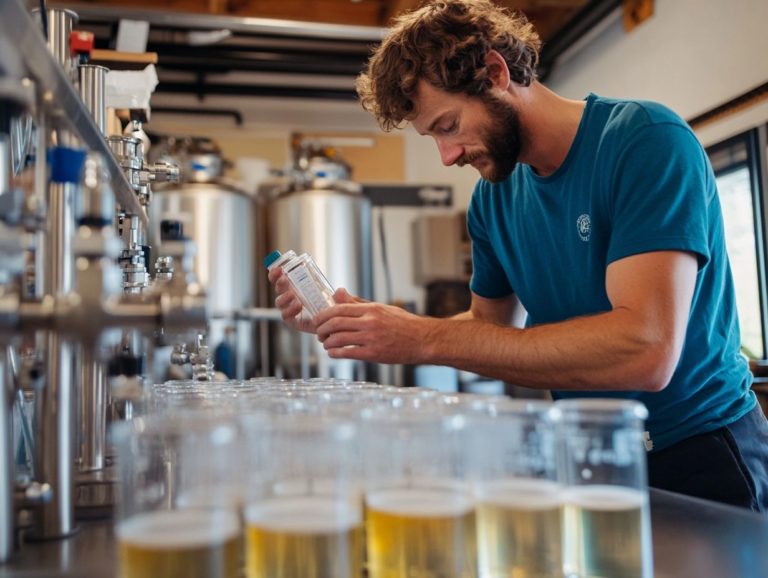How to Navigate Brewing Regulations at Home
Home brewing provides a rewarding opportunity for you to craft your own unique beverages! However, it s essential to adhere to important guidelines and practices to ensure both safety and compliance. Understanding the nuances of the brewing process and utilizing proper brewing equipment can significantly enhance your brewing experience.
This guide outlines the essential steps for home brewing, beginning with a thorough understanding of local laws and acquiring the necessary permits. It also highlights crucial safety measures to protect your beer ingredients and brewing equipment, identifies common pitfalls to avoid, and offers helpful resources to keep you informed.
Whether you re just starting out or seeking to refine your skills, this guide empowers you to brew with confidence using proven brewing methods.
Contents
- Key Takeaways
- What Are The Steps To Follow For Home Brewing?
- What Are The Safety Measures To Take When Brewing At Home?
- 2. Use Of Quality Ingredients
- 3. Proper Storage Of Ingredients And Finished Products
- 4. Monitoring And Controlling Fermentation Process
- What Are The Common Mistakes To Avoid When Home Brewing?
- What Are The Resources Available For Home Brewers To Stay Compliant?
- Guide to Navigating Brewing Regulations at Home
- Frequently Asked Questions
- What are the basic regulations to keep in mind when brewing at home?
- Do I need any special permits or licenses to brew beer at home?
- Can I sell my home brewed beer?
- Are there any restrictions on the types of ingredients I can use in my home brewed beer?
- Are there any labeling requirements for home brewed beer and small-batch brewing?
- What are the consequences of not following home brewing regulations at home?
Key Takeaways

- Be aware of laws and regulations in your area and obtain necessary permits and licenses for home brewing.
- Follow safety measures such as proper sanitation, use of quality ingredients, and monitoring the fermentation process to ensure a safe and high-quality product.
- Avoid common mistakes like not following regulations, not properly sanitizing equipment, and not keeping detailed records. Utilize online resources, homebrew clubs, and local homebrew shops for support and information on staying compliant.
What Are The Steps To Follow For Home Brewing?
Home brewing is an engaging journey that invites you to explore the art and science of crafting beer right in the comfort of your own home. Whether you re a novice craft brewer or a seasoned enthusiast, grasping the essential steps of the home brewing process is crucial for your brewing success.
Understanding the brewing science behind each step can significantly improve your brews. From selecting high-quality ingredients to mastering the intricate brewing techniques, every phase adds to your overall experience, enabling you to create delicious small-batch brews that perfectly suit your palate.
By following these steps, you’ll seamlessly integrate into the vibrant brewing community and share your unique creations with fellow beer enthusiasts.
1. Research The Laws And Regulations In Your Area
Before you embark on your home brewing journey, it s crucial to look into the laws and regulations surrounding home brewing in your area to ensure you remain compliant.
Neglecting this step could lead to large fines and even legal repercussions that might put a serious damper on your brewing ambitions. Understanding the necessary permits, production limits, and community guidelines is vital for anyone eager to craft their own beers responsibly.
Adhering to the beer purity law can also be beneficial. You can find a wealth of information through various online resources, such as local government websites and home brewing associations, which offer invaluable insights and updates on these laws.
Staying informed allows you to navigate the often complex legal landscape skillfully, creating a safe brewing environment that honors both your personal creativity and the standards of your community. Utilizing brewing guides can further enhance your knowledge.
2. Obtain Necessary Permits And Licenses
Once you ve researched the laws surrounding home brewing, securing the necessary permits and licenses becomes the next vital step in your brewing journey.
This process requires a keen understanding of the specific requirements set forth by local, state, and federal regulations, each of which may demand different types of documentation. As an aspiring brewer, you’ll typically need to apply for a federal brewer’s notice, which is a required document to legally brew alcohol at a federal level, from the Alcohol and Tobacco Tax and Trade Bureau (TTB), and be prepared for a fee that varies depending on your production scale.
Many states have their own licensing requirements that can range from a simple home brewing permit to a more comprehensive commercial brewing license, depending on how much beer you plan to produce. Compliance with these legal obligations is essential for craft brewers, as it not only legitimizes your operation but also builds trust within the brewing community.
This ultimately contributes to a vibrant and responsible craft beer culture that everyone can enjoy. For those interested in all-grain brewing or extract brewing, understanding these regulations is equally important.
3. Follow Good Manufacturing Practices (GMPs)
Adhering to Good Manufacturing Practices (GMPs) is crucial to ensure the safety and quality of your beer throughout the home brewing process. Effective GMPs incorporate brewing efficiency to improve overall production.
These practices include key components that are essential for effective brewing. For example, the sanitation of your brewing equipment is essential; every tool and vessel you use must be carefully cleaned and sanitized to eliminate any potential contaminants that could compromise your final product. Sourcing high-quality ingredients is equally important; the purity and freshness of your hops, malt, and yeast significantly influence the flavor and aroma of your beer. Using a digital thermometer can help maintain precise temperatures during brewing.
Proper handling procedures are also vital for maintaining consistency in your brews. Following these GMPs safeguards the safety and integrity of your beer while aligning with the beer purity law, which underscores the importance of quality standards in brewing practices. This adherence ensures that your home-brewed beer stands up to the highest standards.
4. Keep Detailed Records
Keeping detailed records throughout your home brewing process is essential for tracking your experience and optimizing your techniques. This meticulous documentation should cover various aspects, such as ingredient quantities, ensuring that each brew remains consistent while still allowing for tweaks and adjustments. Detailed notes on water quality can also impact your brewing success.
By recording brewing times and fermentation details, you can uncover valuable patterns that enhance both efficiency and flavor profiles. Documenting your tasting notes not only helps you refine your recipes but also enables you to share your thoughts with the brewing community. This practice encourages collaboration and innovation, inspiring others to build upon proven methods and ultimately leading to the creation of unique personal beer recipes that truly reflect your individual tastes and preferences. Proper monitoring of fermentation time and beer alcohol content can further refine your brewing techniques.
What Are The Safety Measures To Take When Brewing At Home?
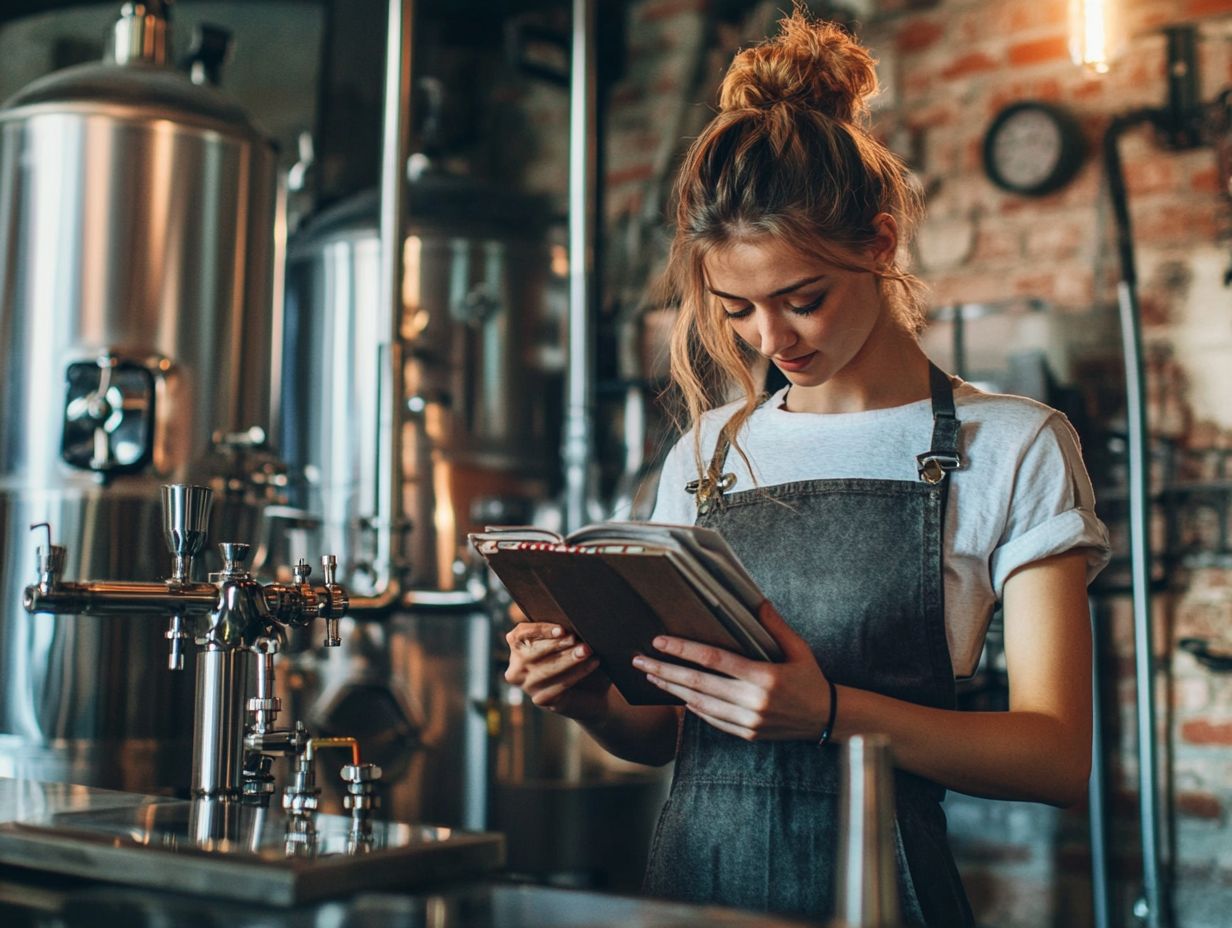
Implementing safety measures is your secret weapon for brewing success! By taking these precautions, you can reduce risks and ensure your beer is of top quality. Utilizing brewing tips from seasoned brewers can further enhance your brewing journey.
1. Proper Sanitation of Equipment and Ingredients
Proper sanitation of your brewing equipment and ingredients stands as a fundamental safety measure that profoundly influences the quality of your beer during home brewing. This step is critical; any contaminants introduced during the brewing process can result in off-flavors, spoilage, or even complete fermentation failure.
To achieve a successful brew, you must meticulously clean your brewing kettles, fermentation vessels, and all associated equipment with a suitable sanitizing solution, such as Star San or Iodophor. These products are adept at eliminating bacteria and wild yeast that could disrupt the desired yeast fermentation, ultimately affecting the taste and clarity of your final product. This attention to detail is especially important during brew day to ensure consistency.
Every surface and utensil that comes into contact with the wort (the liquid extracted from the brewed ingredients, which is later fermented into beer) or beer requires your careful attention for sanitation. Neglecting this step can lead to unexpected microbial intrusions that compromise the entire brewing process. This attention to detail can make the difference between a successful and a failed brew.
2. Use Of Quality Ingredients
The use of quality ingredients is essential in home brewing. It significantly impacts the flavor and overall character of your beer. Choosing the right recipe kits can simplify the process for beginners.
Selecting high-quality malted barley is vital. It provides the necessary sugars for fermentation while imparting a range of flavors, from sweet caramel to rich chocolate notes, depending on the specific type of malt you choose.
Hops play a crucial role as well. They contribute bitterness, aroma, and stability, all of which are essential for balancing the sweetness of the malt. Knowledge of hops flavor can greatly influence your brewing decisions.
Don t underestimate the importance of fresh water; its mineral composition can enhance or mute certain flavors. This ultimately affects your beer’s final taste and mouthfeel. Attention to water quality is crucial for brewing success.
By carefully sourcing these ingredients, you can experiment with various combinations. This creates unique styles that truly reflect your personal touch and elevates the overall sensory experience for anyone lucky enough to savor each sip. This exciting approach invites you to dive into diverse beer styles and explore creative brewing methods!
3. Proper Storage Of Ingredients And Finished Products
Proper storage of your ingredients and finished products is paramount for preserving the quality and safety of your home-brewed beer. It also ensures that your beer conditioning process is effective.
To ensure that everything from malt, hops, and yeast to the final product retains its flavor and aroma, it is essential to adhere to specific storage practices.
Store your malt in a cool, dark place in airtight containers to guard against moisture absorption and flavor loss. Hops, with their potent character, benefit from refrigeration to keep their fragrance and bitterness intact.
Yeast thrives best at controlled temperatures in a dark environment. Proper storage is key for maintaining brewing efficiency.
Once you’ve completed the brewing process, it’s crucial to store your finished beer upright in a cool, dark location to maintain carbonation. Ignoring these storage practices can lead to contamination, resulting in off-flavors and spoilage that could tarnish the enjoyment of your hard work.
Knowledge of beer carbonation can greatly improve the final product.
4. Monitoring And Controlling Fermentation Process
Monitoring and controlling the fermentation process is essential for ensuring that your home-brewed beer achieves the perfect flavor and alcohol content.
You must maintain an optimal temperature range for yeast fermentation. Yeast is particularly sensitive to temperature fluctuations. When conditions aren’t just right, you risk developing off-flavors and a final product that falls short of your expectations.
Utilizing tools like digital thermometers allows you to regularly check the temperature, giving you the ability to make timely adjustments. This careful monitoring enhances your brewing efficiency and elevates the overall quality of your beer.
By ensuring that the flavors develop as intended, you can provide yourself and your guests with a consistently satisfying drinking experience.
What Are The Common Mistakes To Avoid When Home Brewing?
Identifying and steering clear of common mistakes in home brewing is crucial for elevating your brewing experience. It ensures that your beer production is not just successful, but truly exceptional.
1. Not Following Regulations

One of the most critical mistakes you must avoid in home brewing is neglecting to adhere to local laws and regulations governing brewing practices.
Failing to do so can open the door to a myriad of legal complications, ranging from hefty fines and confiscation of your precious equipment to the possibility of criminal charges in extreme cases. Disregarding these regulations not only jeopardizes your own brewing endeavors but also casts a shadow over the broader brewing community, fostering a negative perception that can impact both hobbyists and professionals alike.
It’s crucial for those who embark on the home brewing journey to realize that compliance isn’t merely about dodging penalties; it’s about cultivating a responsible and sustainable environment for the craft. By prioritizing legal adherence, you can actively contribute to the growth and respectability of brewing as a whole, ensuring a legacy of passion and creativity that flourishes without the burden of legal troubles.
2. Not Properly Cleaning And Sanitizing Equipment
Neglecting to thoroughly clean and sanitize your brewing equipment is a common misstep that can lead to contamination and spoilage of your beer.
To ensure a successful brewing process, it’s vital for you to recognize that the cleanliness of your equipment directly impacts the flavor and quality of your final product. By utilizing products specifically designed for brewing, such as PBW (Powdered Brewery Wash) and Star San, you can significantly enhance your sanitizing efforts.
Employing techniques like soaking and thorough scrubbing, followed by rinsing with hot water, is essential for removing residues and preventing unwanted bacteria from disrupting fermentation. When you prioritize sanitation, your yeasts can thrive, leading to a more flavorful and aromatic beer. This makes the initial investment in proper cleaning tools not only worthwhile but essential for achieving brewing excellence.
3. Not Controlling Fermentation Temperature
Neglecting to control fermentation temperature is a critical error that can negatively impact yeast fermentation and your overall brewing efficiency.
Temperature fluctuations can create inconsistent fermentation rates, leading to off-flavors and aromas that mar the intended profile of your beer. You must remember that yeast is exceptionally sensitive to temperature changes; if the environment is too warm, it might produce unwanted esters and phenols, while cooler temperatures could slow down fermentation, leaving you with residual sugars and a cloyingly sweet finish.
To maintain optimal conditions, you should consider investing in temperature control devices, like fermentation jackets or temperature-regulated fermentation chambers, and make it a habit to monitor regularly. Additionally, picking a yeast strain tailored to your specific brewing style can greatly enhance consistency and help you achieve a high-quality final product.
4. Not Keeping Detailed Records
Neglecting to keep detailed records throughout your home brewing process is a mistake that could significantly limit your ability to replicate those successful beer recipes.
Accurate documentation enables you to monitor ingredient quantities with precision, which is essential for ensuring that each batch delivers the same delightful flavors and aromas you ve come to love. By recording brewing times and fermentation conditions, you can identify what works best for your unique setup, enhancing your efficiency and minimizing unexpected surprises.
Embracing a systematic approach to your records will not only enrich your overall brewing experience but also help you achieve consistent results time after time. Ultimately, thoughtful documentation can transform your brewing journey, turning it into a craft that harmoniously blends artistry with science.
What Are The Resources Available For Home Brewers To Stay Compliant?
For home brewers eager to navigate the complexities of regulations while honing their craft, a wealth of resources awaits to elevate their brewing journey.
1. Online Resources
There are numerous online resources available to help you elevate your brewing knowledge and navigate the regulations with ease.
Websites like the Homebrewers Association and BrewYourOwn.com are treasure troves of recipes, practical tips, and comprehensive guides designed for brewers at every skill level. If you re drawn to interactive learning, platforms like MasterClass and Udemy offer dedicated courses in the art of brewing, allowing you to learn at your own pace and in your own style.
Engaging with online forums such as Reddit s r/Homebrewing or BeerAdvocate can cultivate a sense of community where you can ask questions, share your experiences, and tackle challenges collaboratively. By becoming a member of these vibrant communities, both beginners and seasoned brewers can forge connections that will enhance their brewing journey.
2. Home Brew Clubs And Associations

Joining home brew clubs and associations opens the door to invaluable support, networking opportunities, and a wealth of knowledge within the brewing community.
Joining local organizations gives you access to informative workshops where seasoned brewers share their insights. You’ll have the chance to experiment with new techniques and ingredients that can elevate your craft to new heights.
Tastings provide a delightful opportunity for you to sample a diverse range of brews, sparking discussions about flavor profiles and brewing styles that will broaden your perspective.
Competitions organized by these clubs invite a spirit of friendly rivalry, allowing you to showcase your creations while fostering collaboration and camaraderie among fellow craft brewers. As you share tools, resources, and experiences, you’ll find yourself in a nurturing environment that fuels your creativity and passion for brewing.
3. Local Home Brew Stores
Local home brew stores serve as essential havens for home brewers like you, providing an impressive array of brewing equipment, ingredients, and recipe kits tailored to elevate your brewing experience.
Here, you ll find everything from premium malts and hops to specialized yeast strains, ensuring that you can craft a diverse selection of beers that cater to your unique palate. The knowledgeable staff is eager to share insights that can transform your brewing experience.
Moreover, many local breweries cultivate a vibrant sense of community by hosting events such as tastings, workshops, and competitions. Don’t miss out on these gatherings to connect with fellow enthusiasts, exchange experiences, and gain new insights.
Ultimately, these stores are instrumental in supporting brewers at every skill level, enabling you to refine your craft and achieve impressive brewing results.
Frequently Asked Questions
What are the basic regulations to keep in mind when brewing at home?
In the United States, home brewing is legal on a federal level, but each state has its own specific regulations. Always check local laws to stay compliant regarding alcohol production and consumption.
Do I need any special permits or licenses to brew beer at home?
Generally, home brewers do not need any special permits or licenses as long as the beer is for personal consumption and not for sale. However, some countries and states may require a permit or registration, so it is important to check the laws in your area.
Can I sell my home brewed beer?
In most cases, selling home brewed beer is illegal without the proper licenses and permits. However, some states do allow small-scale commercial brewing operations, so it is important to research and follow the regulations in your state.
Are there any restrictions on the types of ingredients I can use in my home brewed beer?
While there are no federal regulations on ingredients for home brewed beer, which involves various beer ingredients like malted barley (a key ingredient made from barley grain that has been soaked and allowed to germinate before drying), hops, yeast, and water, some states may have restrictions on certain ingredients, such as the use of fruits or herbs. It is important to research and follow the regulations in your state. Home brewing can be a rewarding hobby, particularly when you follow the brewing process closely.
Dive into the world of brewing and start experimenting today!
Are there any labeling requirements for home brewed beer and small-batch brewing?
In the United States, there are no federal labeling requirements for home brewed beer. However, some states may have specific rules, such as including the Alcohol by Volume (ABV) on the label.
Other details like brewing methods and beer styles may also be required. Researching the laws in your state is crucial to ensure compliance.
For brewing enthusiasts, understanding these nuances adds to the fun of the brewing experience!
What are the consequences of not following home brewing regulations at home?
The consequences of ignoring brewing regulations can vary by state. You might face fines, have your equipment confiscated, or even face criminal charges.
Complying with the regulations helps you avoid legal issues. Following the beer purity law, known as Reinheitsgebot, can also lead to better brewing outcomes.
Always refer to a comprehensive brewing guide for best practices and enjoy the journey of brewing!

